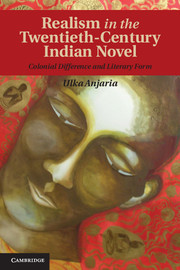Description
Realism in the Twentieth-Century Indian Novel
Colonial Difference and Literary Form
Author: Anjaria Ulka
This book shows how realism in twentieth-century Indian literature functioned as a mode of experimentation and aesthetic innovation.
Language: EnglishApproximative price 100.30 €
In Print (Delivery period: 14 days).
Add to cart
Publication date: 10-2012
219 p. · 15.9x23.6 cm · Hardback
219 p. · 15.9x23.6 cm · Hardback
Description
/li>Contents
/li>Biography
/li>
Early twentieth-century Indian novels often depict the harsh material conditions of life under British colonial rule. Even so, these 'realist' novels are profoundly imaginative. In this study, Ulka Anjaria challenges the distinction between early twentieth-century social realism and modern-day magical realism, arguing that realism in the colony functioned as a mode of experimentation and aesthetic innovation ? not merely as mimesis of the 'real world'. By examining novels from the 1930s across several Indian languages, Anjaria reveals how Indian authors used realist techniques to imagine alternate worlds, to invent new subjectivities and relationships with the Indian nation and to question some of the most entrenched values of modernity. Addressing issues of colonialism, Indian nationalism, the rise of Gandhi, religion and politics, and the role of literature in society, Anjaria's careful analysis will complement graduate study and research in English literature, South Asian studies and postcolonial studies.
Acknowledgments; 1. Realism in the colony; Part I. Itineraries of Character: 2. The contours of the human; 3. Experiments with Gandhi; Part II. History and the Future: 4. Staging realism and the ambivalence of nationalism; 5. Aimless bildung and the longing for form; Afterword; Works cited; Notes.
Ulka Anjaria is Assistant Professor of English at Brandeis University. Her work has been published in several edited volumes and journals, including Novel: A Forum in Fiction, Economic and Political Weekly and the Journal of South Asian Popular Culture. She received her PhD from Stanford University in 2008.
© 2024 LAVOISIER S.A.S.





